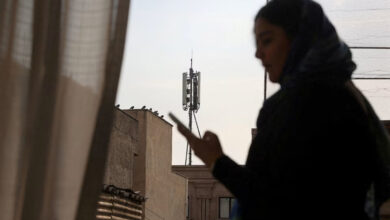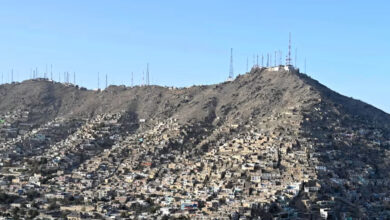The recent crackdown on the al-Jazeera Mubasher Misr channel, preceded by a decision to halt the authorization of new satellite channels, has reinforced assumptions that Egypt’s military rulers are reproducing Hosni Mubarak’s oppressive media policies.
On Sunday, authorities raided the Cairo headquarters of the 24-hour news channel Al-Jazeera Mubasher Misr, confiscated transmission equipment and detained one of the channel’s engineers. Information Minister Osama Heikal defended the clampdown in a press conference held on Monday, saying that the channel had been airing for nearly six months with no license and that its owners had not met paperwork requirements.
Yet, the channel’s lawyer, Islam Lotty, offered a different account, affirming that Al-Jazeera had applied for a license several months ago. “We were told that we had already met all requirements, that we could start airing and that we would be contacted if there was any problem,” said Lotfy.
Al-Jazeera: An old enemy
For some observers, the clampdown on Al-Jazeera Mubasher Misr is reminiscent of the hostility of Mubarak’s regime toward the Qatari-owned Al-Jazeera news network. The pan-Arab Al-Jazeera network was hated by the former regime for its critical coverage of Egypt’s politics. On several occasions, the regime had retaliated by detaining the channel’s reporters, barring them from covering crucial events or confiscating their tapes. The channel’s editorial content had also contributed to worsening Egyptian-Qatari relations.
On 1 March, the network launched Al-Jazeera Mubashir Misr to serve as Egypt’s first privately-owned 24-hour news channel, seizing the opportunity presented by the departure of Mubarak, whose regime had always resisted the authorization of private news channels.
Heikal, the information minister, denied that Egypt’s rulers are after the al-Jazeera network, arguing that if they had been, they would have closed down the bureaus of the pan-Arab al-Jazeera and the English-speaking Al-Jazeera International, which are still sending televised feeds from Egypt to the channel headquarters in Doha. In the meantime, he denied any intention to curb freedom of expression. However, Lofty sees the ban as ominous of further attacks on the media.
“This [the closing of Al-Jazeera Mubasher Misr] is not a good sign… There are several measures that are being taken concurrently… and together they create an atmosphere worse than the one that accompanied Mubarak’s rule,” Lotfy told Al-Masry Al-Youm.
The ban on Al-Jazeera Mubasher Misr came on the heels of the government’s decision to stop issuing licenses for new satellite channels. The information minister defended the government’s decision, explaining that the government had realized that many channels are being launched to serve as platforms for electoral campaigns, which is believed to threaten impartial media coverage. He promised that the ban would be lifted in a few weeks.
“It seems that power holders cannot bear the media any longer,” Essam Eddin Hassan, a human rights advocate with the Cairo Institute for Human Rights Studies, said in a sarcastic tone. “It also seems that they still do not understand that Egyptians have launched a revolution, which requires new policies that are different from those of Mubarak.“
A ban preceding a historic vote
These restrictive measures bring back memories of Mubarak’s tightening his grip on the private media during his last days, added Hassan. Ahead of the 2010 parliamentary elections, Mubarak’s regime imposed a set of restrictions on satellite channels, including the ban on cellphone news alerts and live broadcasts of protests. Back then, pundits interpreted the moves as an attempt to block news coverage of vote-rigging practices.
“The same scenario is being reproduced. The only difference is the names of the power holders,” said Hassan. Yet, this time, the ban is not necessarily meant to cover up for “explicit vote-rigging,” added Hassan.
“Vote-rigging will not be explicit. Authorities may just turn a blind eye to the use of violence, thuggery and money to influence voters’ choices,” continued Hassan.
Yet, Hisham Kassem, a seasoned newspaper publisher, rejected Hassan’s theory categorically, holding that recent restrictions are not meant to give the military leeway in fixing the vote in any way.
“Vote-rigging will be extremely difficult,” said Kassem. “The whole country and the whole world will be monitoring these elections. Plus, those holding the poll [the military] have no vested interest in a particular result.”
The military does not need to fix the vote in favor of a particular political party because it will maintain the upper hand in Egypt’s politics no matter who wins the elections, he explained.
For Kassem, the crackdown has to do with a universal military mentality “that is inherently averse to the media and free access to information.” With this outlook, the Supreme Council of the Armed Forces expects the media to have “a negative impact” on the poll, added Kassem.
The countdown for Egypt’s first post-Mubarak parliamentary elections has already started. In November, thousands of candidates are expected to engage in potentially the first democratic race after decades of fraudulent elections.
In recent months, the privately-owned media, namely nightly news talk shows, have served as a platform for political forces to express vehement criticism of the military-issued electoral laws, arguing that they could only serve the remnants of Mubarak’s disbanded National Democratic Party and Islamists. Similar complaints over other military-backed laws and the military council's performance in general have been reverberating mainly from private satellite channels.
In response, Egypt’s military rulers had expressed disgruntlement over the media's performance, accusing it of providing sensational coverage of Egypt’s politics, instigating divisions and threatening the coherence of Egyptian society, and also by having the military prosecutor summon reporters.
Mass communications professor at Cairo University Safwat Al-Alem defended the media, saying: “It is not because the media conveys the debate over laws that are already controversial that it instigates divisions.”
To add fuel to the fire, Egypt’s rulers announced on Saturday the strict enforcement of the Emergency Law in order to establish public order, which was severely shaken after Friday’s riots that targeted the building of the Israeli Embassy and the headquarters of Giza police authority.
While Mubarak always claimed that the Emergency Law only targeted terrorists and drug dealers, the military had widened the scope of the notorious legislation to include other offenses, such as criminal damage to state property and disrupting people’s work, blocking roads through demonstrations, and spreading “false news” and information.
This last offense had sent shocking waves out to journalists and human rights activists, who feel it could be used as a pretext to curb freedom of expression further.
“We have enough laws that can prosecute whoever disseminates false news, so we did not need the Emergency Law to penalize a journalist if he commits a publishing crime,” said Hassan.
Regulating the airwaves
Earlier this week, the information minister told reporters that the government needs to revisit the regulations governing private radio stations and television channels.
Heikal said that the cabinet is studying different Western models of regulatory bodies, but added that it is more inclined to borrow the model of France’s Supreme Audiovisual Council (CSA). This independent body is in charge of issuing licenses and monitoring the performance of radio and television to ensure that they respect a set of principles, including the respect for human dignity, pluralism in thought, public order, the protection of childhood and adolescence. The CSA should also make sure that the media does not incite hatred or violence on grounds of sex, morality, religion or nationality, etc. This body has the right to impose sanctions or fines on media outlets if they violate, but has no authority to close down any medium.
Mohamed Nasser, news editor of the famous nightly news talk show Al-’Ashera Masaan (10 pm), agreed that private television needs to be regulated, especially after the recent boom in private satellite channels that are particularly suspicious in terms of funding and editorial agenda, he said.
“I personally have a lot of doubts over new satellite channels,” said Nasser, who also used to work as programming director at al-Jazeera Mubasher Misr.
“Some of them are launched for money-laundering purposes. Others belong to businessmen who were loyal to the former regime and want to use channels to orient the revolution in a way that could serve their interests,” added Nasser, citing what he says are official statistics proving that 22 television channels have hit the airwaves between March and June 2011.
Earlier this summer, Nasser spoke at a conference held by a local think-tank about the status of the private media after Mubarak’s fall. Most panelists agreed that the private media needs to be regulated by an independent body of professionals in a way that would safeguard media freedom and in the meantime protect professional standards and media ethics and ensure budget transparency.
For Nasser, Heikal and the Supreme Council of the Armed Forces might not be the best people to design such delicate regulations.
“They would come up with a distorted law that would fail to meet the hopes of journalists and the street,and that would put restrictions on the media,” he concluded.




